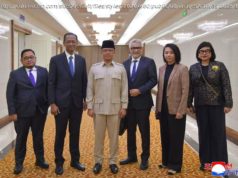Advocates for South Korean victims of one of the most tragic massacres in the country’s history made a direct appeal to a left-wing party on Monday.
SEOUL, Aug. 20 (UPI) — Advocates for South Korean victims of one of the most tragic massacres in the country’s history made a direct appeal to a left-wing party on Monday, calling for reparations for the few remaining survivors and their families.
Oh Im-jong of the Association for Bereaved Families of 4.3 Victims and his colleague Kim Chang -beom were among those meeting with South Korean politician Chung Dong-young of the center-left Party for Democracy and Peace, an opposition party, pleading for progress on reparations.
Oh said justice for the victims had been stalled since October 2003, when former South Korean President Roh Moo -hyun apologized to the residents of Jeju Island, where the attacks took place in 1948.
« Due to wrongful decisions of the government, many innocent people of Jeju suffered many casualties and destruction of their homes, » Roh said in his 2003 statement, referring to the deaths, estimated to number 14,000 to 30,000, at the hands of anti-communist security forces.
« There was a movement toward creating a system [for victims’ reparations] at the time, » Oh said Monday at the party’s designated room in the National Assembly building, where portraits of Roh and former President Kim Dae-jung hung on the wall. « But after the official announcement in 2003, no investigations followed. »
Chung said Monday his party would do what it could to bring improved justice to the victims.
The Party for Democracy and Peace is « weak, » Chung said. « But our party will lead the way to help you. »
Oh said there was some progress on reparations during the Roh administration, when Chung was unification minister.
Bills in parliament subsequently faced delays under successive right-wing administrations, Oh said, adding there might be room to make adjustments ahead of the 100-year anniversary of Korea’s Independence or Samil Movement in 2019.
But following the discussion with Chung, Kim Chang-beom told UPI that despite some critique of South Korea’s right-wing parties during the talks, he « didn’t expect too much resistance from conservatives » in getting a bill passed that will address the victims.
« There’s some concern about the conservatives, but that’s about it, » Kim said. « Blatant opposition [to reparations] from conservatives, that’s not what is at issue here. »
In addition to addressing compensation for victims, the group also said their « honor » must be restored and the results of « illegal military trials » be annulled.
Many of the victims were labeled traitors after South Korea’s parliament outlawed the Workers’ Party of South Korea in 1948.
The Association for Bereaved Families of 4·3 Victims and a partner group, the Jeju 4·3 70th anniversary committee, have rebuilt awareness about their cause following the removal of former President Park Geun -hye from office.
On Dec. 19,2017, Seoul’s parliament passed a motion for a revised bill, and current Justice Minister Park Sang-ki has expressed an official opinion on the April 3 Jeju Uprising.
U. S. involvement
The massacre of ordinary Koreans that took place starting April 3,1948, occurred in a region of the South that had exercised a greater degree of political independence than the rest of the country, following liberation on Aug. 15,1945.
According to Bruce Cumings, the influential historian of Korea at the University of Chicago, even as the United States occupied the South, Jeju’s various people’s committees were governing themselves until April 1948.
« What the United States allowed systematically directed the suppression of Jeju rebellion after April 1948. Several other Americans engaged in the action of suppression of the rebels. They seemed to have no concern regarding the extraordinary loss of life. They just wanted the rebellion put down, period, » Cumings said, according to a pamphlet from the 70th anniversary committee made available to the South Korean public.
On April 3 of that year, South Korean military police fired at demonstrators after Jeju residents refused to vote in a United Nations-backed election.
Jeju residents, particularly those affiliated with left-wing parties, believed the U. N. elections would permanently divide the peninsula.
Massacres and attacks continued through 1948, while entire villages burned and girls were often gang raped before being executed by anti-communist paramilitary forces, according to survivor testimonies.
In 2003, South Korea’s National Committee for the Investigation of the Truth concluded the U. S. army military government and the Korean military shared responsibility for the incident.
In April, during a memorial ceremony for victims, South Korean President Moon Jae -in had said he would pursue state-level reparations.






